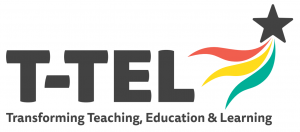
Akwasi Addae-Boahene presenting at the UCET Conference
Annual Conference 2023
On November 15th, 2023, a team from Ghana made up of Akwasi Addae-Boahene–Chief Technical Advisor T-TEL, Bea Noble-Rogers–Key Advisor T-TEL, Eric Ananga–Key Advisor T-TEL, Nana Akosua Owusu-Ansah-University of Education Winneba, Joyce Anku–University of Ghana, Rebecca Arthur- University of Education Winneba presented at the UCET 2023 Conference in Leeds United Kingdom. The theme for the 2023 Conference is Promoting Quality in Teacher Education, and the title of the presentation was “Senior High School Education in Ghana: The challenging path to Reform”.
Introduction to the presentation
The secondary education reform in Ghana aimed at providing high-quality relevant secondary education to equip graduates with 21st century skills and competencies, social and emotional learning, and character development in addition to literacy and numeracy. Central to this reform is the design of a new SHS/SHTS/STEM curriculum to produce graduates for the world of work, adult life, and further studies.
The reforms introduce flexible pathways for progression to facilitate the choice of subjects in new SHS, SHTS and STEM curriculum. The emphasis on 21st century skills and competencies, character development, national values, Social and Emotional Learning (SEL), Information Communications Technology, Gender Equality and Social Inclusion (GESI) in the curriculum is aimed at producing graduates who can compete in the global knowledge economy. In addition, Assessment – formative and summative has been incorporated into the curriculum and aligned with the learning outcomes throughout the three-year programme.
Ongoing Secondary Education Reforms in Ghana
The presentation focused on the on-going reform process and the challenges likely to be faced in the implementation of the new curriculum. The presentation therefore focused on previous experiences and lessons learnt from the development of the primary school and JHS curricula, and how these have become important learning points for the new programme. The writing of the curriculum brought together subject experts from universities, schools, Colleges of Education, employers’ associations, and other experts in curriculum within the education sector. The draft curriculum was also subjected to an international experts’ panel review for feedback before it was finalized.
Key activities undertaken in preparation for implementation include the trialing of the draft curriculum in schools including various stakeholders engagements to secure the necessary legal and political support of Cabinet. Additionally, weekly professional development (PD) sessions have been introduced in all Senior High Schools (SHSs), Senior High Technical Schools (SHTSs), and STEM schools across the country
There are also plans to redesign the Secondary School Teacher Education Curriculum to focus on the delivery of the new curriculum. This will require a curriculum that prepares teachers in the use of learner centered pedagogical approaches and strategies, GESI responsive pedagogies, assessment and Supported Teaching in School to adequately equip them to deliver the new curriculum.
Participants at the presentation got the opportunity to watch a compiled video of the curriculum trialing in selected schools where learners and teachers shared their experiences after the teachers trialed the curriculum in their classrooms.
Post presentation workshop
After the presentation a workshop was organized to elicit the views of the participants on the following issues:
- What steps have we missed?
- What should we be mindful of, addressing the challenges?
- What are the unforeseen challenges?
- What other strategies should we deploy?
The workshop generated conversations among the participants. They shared their views and experiences from other contexts.
Some participants stated that the curriculum as was presented is very good, promising, and ambitious. Some participants also highlighted the important issue of stakeholder ownership, and how this can be used against political transition in Ghana in 2025. In the view of the participants, the stakeholder engagement process carried out will positively guarantee the successful implementation of the curriculum notwithstanding the government in power. This according to some participants stemmed from their individual experiences of the curriculum implementation when there are changes in government. Others also cautioned on the ability of the government to provide the resources needed to implement the curriculum effectively.
Some participants also spoke about teacher orientation, retraining and retention and suggested the government works hard to motivate and change the mindset of teachers to implement the curriculum successfully.
In response to the comments and suggestions, the Chief Technical Advisor of T-TEL emphasized that since 2023, there has been a national rollout of professional development sessions in all Senior High Schools, Senior High Technical Schools, and STEM Schools across the country. This is done through weekly school based Professional Learning Communities with structured materials developed to introduce teachers to the key principles, philosophy, pedagogical and assessment approaches introduced in the curriculum. A participant suggested that apart from the professional development materials, teachers should be encouraged to form subject based professional learning communities beyond their schools to support each other throughout the implementation of the curriculum. A participant who had had several years of working in Ghana suggested that a lot of attention should be paid to the northern sector of Ghana when implementing the curriculum.
Some participants also raised concerns about assessment. The participants asked about the plans that have been put in place to instill confidence in the proposed assessment system.
